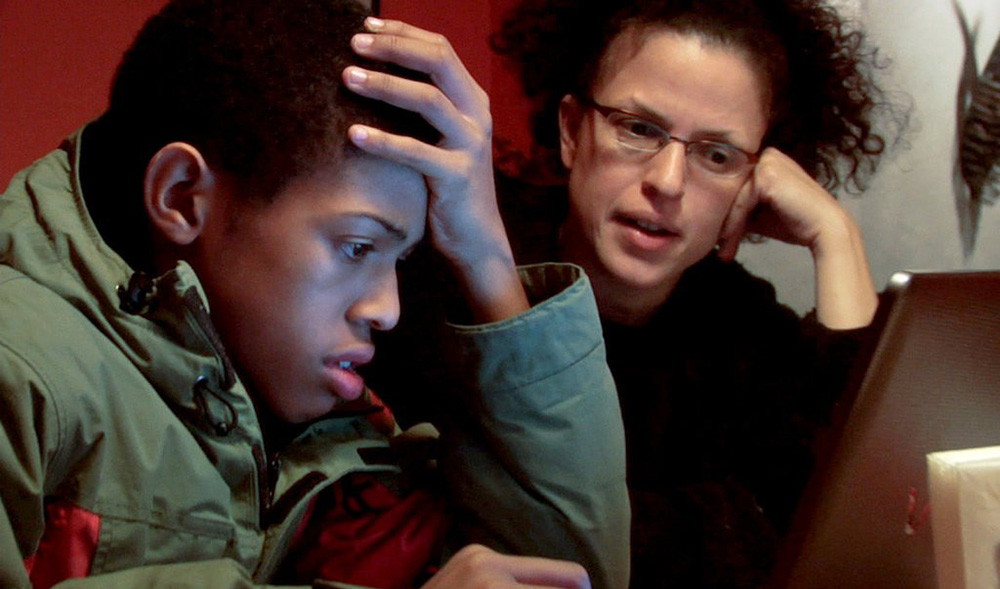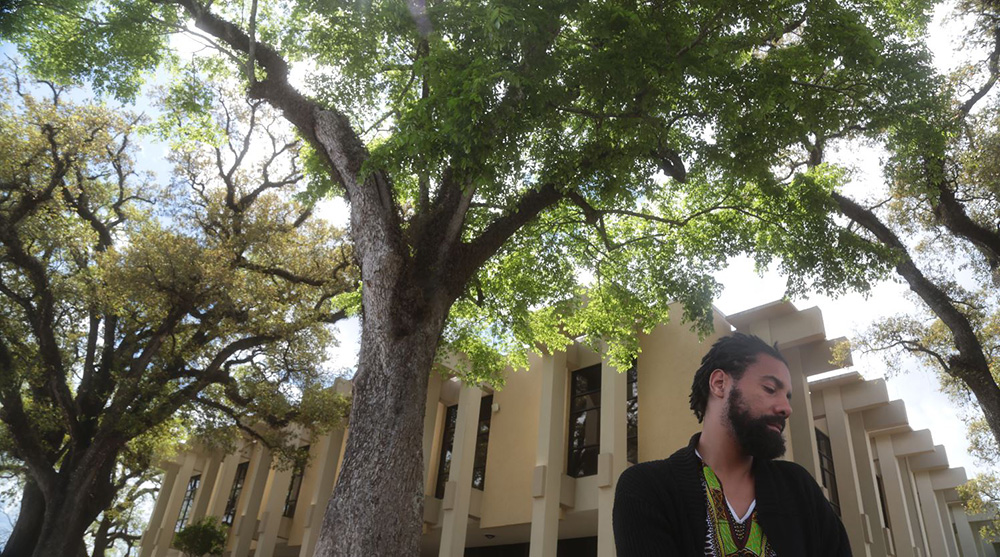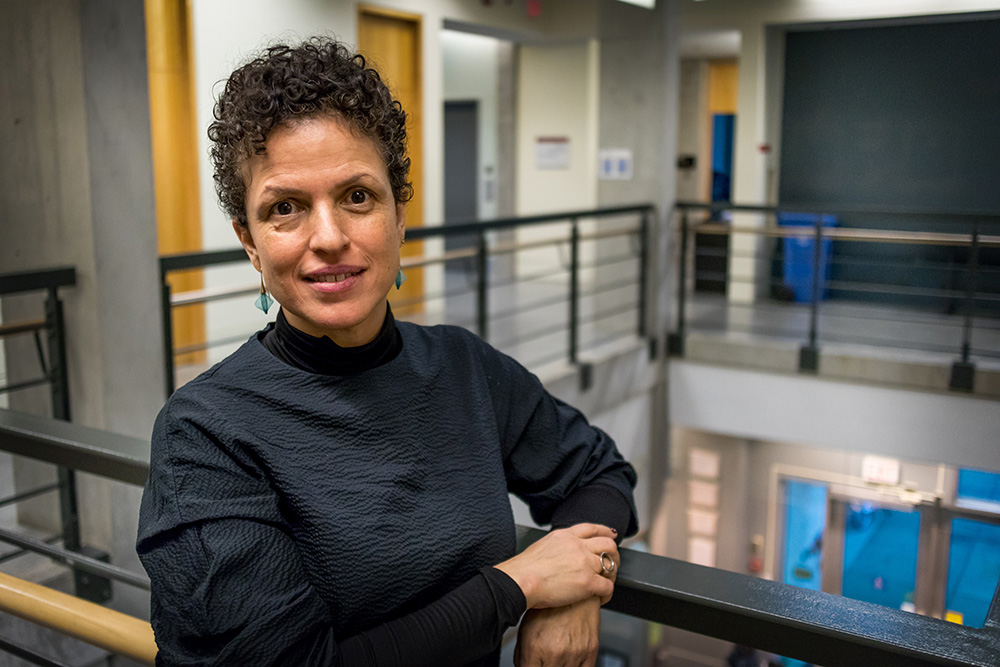If conversation is the sharing of stories, which stories are shared, and who gets to tell them?
This thought occurred in to me in the middle of watching The Changing Same, Michèle Stephenson’s film about a lynching.
Filmmaker, artist and author Stephenson, a visiting professor at the UBC School of Journalism, is speaking Wednesday evening in Vancouver. The topic is “Building Narratives of Liberation,” a practice she has been honing since she decided to leave her career as a human rights lawyer to dive into documentary filmmaking.
Stephenson and her partner Joe Brewster started the Rada Film Group with the intent of “telling stories about communities that have been neglected by the mainstream media.” The couple’s first documentary American Promise premiered at the 2013 Sundance Film Festival where it won the Special Jury Prize for Excellence in Filmmaking.
American Promise centered on the education of their son Idris and his best friend Seun over the course of 13 years. After its premiere the film screened across the U.S., was broadcast on PBS and inspired social awareness campaigns. The Rada Film Group also produced a number of short films for the New York Times op-doc series entitled A Conversation on Race. If you missed the series when it first launched, all of the films are well worth revisiting, especially when conversations about the subject, in both the U.S. and Canada, remain fraught and often anguished.
The op-doc films address race head on with a variety of different people facing the camera and talking about their experiences. The stories range from funny to terrifying — from black parents having the conversation with their kids about getting stopped by the police, to the police themselves struggling with issues of trust and responsibility.
The people on camera are blunt and clear about the repercussions, personal and cultural, that have shaped them. Although the series is aimed at an American audience, its relevance should not be lost on Canadians. It’s a subject I immediately trip over when talking to Stephenson on the phone prior to her lecture. Is it a relief to be away from the U.S. at the moment, I ask, with everything’s that happening there?
She gently corrects me, “Well, it’s not like things are different in Canada, with the pipelines and First Nations people, I believe there’s been a few arrests?” Stephenson was born in Haiti, but her family moved to Canada when she was nine. “I had racial confrontations in Quebec,” she says.
Not content to make one fumbling comment, I make a few others. These issues of whose stories, whose lives and whose struggles are represented in the society-wide conversation mediated by television, film, the Internet. Are things any better in terms of representation, since American Promise came out?

Again, Stephenson is gentle but clear in explaining that some change is not yet enough, and the reasons are structural. “It’s about who makes the decisions. Who gets funded, who gets seen.”
In a year that has delivered seemingly more stories from diverse filmmakers and storytellers, be it Barry Jenkins’s adaptation of If Beale Street Could Talk, Boots Riley’s kooky takedown of corporate culture Sorry to Bother You, and even a young Spider-Man of colour, barriers to real money and real power persist.
As Stephenson has written, “There is no separating the creative from the political.” As her focus on her own family in American Promise attests, she is fearless in creatively mixing the most deeply personal with the political.
Getting real
In September, Stephenson gave a version of the talk she will be offering Wednesday evening. The setting was the Getting Real conference offered by International Documentary Association. Getting real is not easy, as Stephenson emphasized in her keynote address. The person who does so usually pays a price.
The repercussions can be economic and cultural: “What do I stand to lose?” Stephenson muses in her talk. “One fear would be rejection, banishment from the community, not getting that next grant or Netflix deal, or never getting another speaking engagement. And you know what? Given the current social and political climate we live in today, risk to me has become a necessary part of living and taking a stand. So, I have decided to get real. But getting real starts with getting personal, from my life’s beginnings.”
So, let’s get real.
Talking about race is hard. It’s awkward, embarrassing and deeply uncomfortable. It requires you to take a long look at your own privilege, as well as your prejudices, to pull them squirming into the light.
I felt a level of discomfort even trying to talk about the subject, and in this Stephenson’s op-doc film about white people discussing race hit close to home. It’s there in the awkwardness and reluctance, as people’s gaze drifts away from the camera, seemingly fascinated with something high in the left-hand corner of the screen. You feel in it your own body, as your spine stiffens, and forming a coherent interview question suddenly feels beyond you.
Can we achieve personal or social transformation without getting real about our own complicity in maintaining the unjust structures we are a part of?
It’s not the job or responsibility of people of colour to shoulder the bulk of this kind of work. James Baldwin said it best: “The question you gotta ask yourself — the question the white population has to ask itself — is why was it necessary to have a Negro in the first place.”
The fact that Baldwin said these words so many decades ago is one thing. Another is the number of young people of colour killed by police, and refugee kids imprisoned in camps on the American border. In B.C., it’s First Nations women disappearing along the Highway of Tears. Race is a conversation we need to have and keep on having. It’s here where art and artists can play a key role. Stephenson quotes Adrienne Maree Brown: “Art is not neutral. It either upholds or disrupts the status quo, advancing or regressing justice.”
That for a person of colour telling the truth very likely invites terrible risk is perfectly illustrated in the short film The Changing Same, which Stephenson co-directed with Joe Brewster.
The story is Lamar Wilson’s. And Claude Neal’s.
Wilson, a poet, discovers that his hometown of Marianna, Florida was the site of a spectacle lynching in 1934. The murder, rarely spoken of by the town’s residents, nevertheless endures, the details buried in old newspaper headlines and in stories shared in quiet voices.
On Oct. 26, 1934, Claude Neal, a 23-year-old black man, was murdered by a mob of white men who dragged him from the county jail, tortured and hung him. A crowd of some 2,000 people attacked his dead body, cutting off his fingers, toes and penis to sell as souvenirs. The savagery spilled over into a riot as gangs of white men rampaged through the black community, destroying homes and black-owned businesses. The violence only ended when the governor called out the National Guard. The event is chronicled in James R. McGovern’s book Anatomy of a Lynching: The Killing of Claude Neal.

On the 70th anniversary of the lynching, Lamar Wilson retraces the route taken by Neal and his killers between the towns of Greenwood and Marianna. In the face of this one-man protest, townsfolk offer subtle and more overt threats, “Don’t go stirring up some crazy mess. Don’t do this. Don’t do this.”
“Paranoia is a very healthy thing in a town like this. It may keep you alive,” Wilson says.
A body and spirit as horrifically violated as that of Claude Neal does not rest easy. As rumours about preserved body parts taken from his mangled corpse persist, the residents of Marianna must face the brutal facts, and as one woman says, “You have to own it to move on.”
The film is currently on the film festival circuit but will be broadcast on PBS. Stephenson is also in the process of adapting the story using virtual reality technology, creating a room-scale installation where the user travels through time and space. She says virtual reality enables a kind of “magical realism as a form of both pilgrimage, and community healing.”
‘What does it take to understand?’
Rada Films has other works underway, including Hispaniola, a film Stephenson describes as “open to experimentation.” Again personal, the film returns the filmmaker to the island nation of her birth and contends with legacies of violence and racism. In making this kind of work, trust is fundamental. “You need the right people in the room,” she says.
Here Canada has something positive to offer. As Stephenson explains, “I’m making a documentary with the National Film Board with women of colour in key roles and in positions of power.” She is also working on new documentary about American poet Nikki Giovanni.
All these stories Stephenson is adding to the conversation. Why has she chosen to make this her life’s work, rather than wielding the law in courtrooms against injustice?
“It’s a battle of narratives, a battle of beliefs and where we want to stand in that battle. We have to have the courage to confront our history; we all have something at stake. Culture has a role to play in power, accountability and story.”
She pauses. “But that is not enough. There needs to be a structural questioning of accountability. Can we do that? What does it take to understand?”
Art can function as a mirror, reflecting experiences. It can act, too, as a prism, refracting experiences and beaming them onto walls for others to see if we care to look. But art has yet to fundamentally alter the fact of white dominance.
“It’s like the air we breathe,” Stephenson states, because “internalized attitudes are consciously and unconsciously replicating white dominance and other systemic inequities in all our relationships. We can’t escape it.”
And yet Stephenson moves relentlessly from committing to film one story after another, her contributions to the conversation motivated, perhaps, by the question she wonders aloud to me. “What will my children inherit?”
As poet Lamar Wilson says. “Everything changes, but nothing changes. The years pass, people live and die, but these ideas about who’s on top and who’s on beneath, and who should stay in their place, those things don’t change.”
So, what does it take? Attention and accountability, a rooting out of one’s own prejudice. Changing the same. Changing the story. ![]()
Read more: Rights + Justice, Film
















Tyee Commenting Guidelines
Comments that violate guidelines risk being deleted, and violations may result in a temporary or permanent user ban. Maintain the spirit of good conversation to stay in the discussion.
*Please note The Tyee is not a forum for spreading misinformation about COVID-19, denying its existence or minimizing its risk to public health.
Do:
Do not: